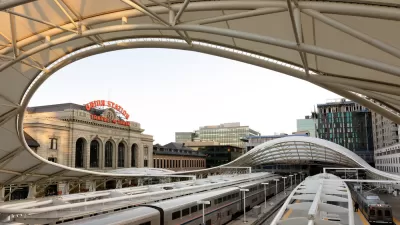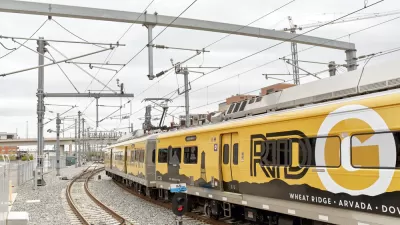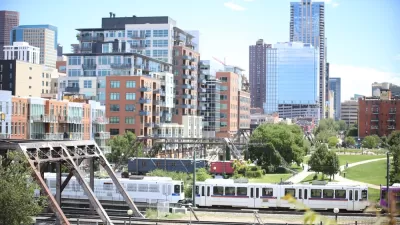Alex Schafran considers Denver's unique position as a trailblazer in suburban retrofitting and sustainable region-building, as an ambitious mass transit project grapples with a tradition of sprawl and fragmented politics.
Denver may not be the first city that springs to mind when it comes to avant-garde urbanism, what with its sprawling suburbs and historic craftsmans – but it is precisely for those traditionally American qualities that is now poised to reshape the way we think about the structure and hierarchy of metropolitan regions. As the Denver Metro area moves forward with FasTracks, a far-reaching expansion of its mass transit system, municipalities are launching corollary planning initiatives to prepare for the needs of a more regionally connected population.
While Downtown Denver pursues more transit-oriented development, it is suburban retrofitting that promises to set a standard for the regionally-conscious adaptation of suburbs elsewhere in the country.
"Denver is, in many ways, the prototypical 20th-century American city," Schafran writes — "a 'city of homes' (as the urban historian Carl Abbott deemed it), a fragmented and sprawling metropolis where the single-family home dominates land use... most of the region is a phenomenally extensive grid of interlocking municipalities, some of which — like Aurora — occupy space in three different counties."
These patterns of geographic development have produced a complex political backdrop for cooperation between local governments. "The history of incorporation and annexation is like a municipal game of Risk, with the rewards being tax base and territory. Aurora... just east of Denver, is now more than half the size of its more famous neighbor, and prefers to call the region the 'Aurora-Denver metro area.' Given the unprecedented cooperation between rival municipalities needed to complete the lengthy planning process, as well as the popular vote across eight counties to raise tax revenue in libertarian Colorado, we have to thing [sic] of FasTracks as a borderline miracle in American planning."
FULL STORY: Retrofitting a Rocky Mountain Metropolis

Planetizen Federal Action Tracker
A weekly monitor of how Trump’s orders and actions are impacting planners and planning in America.

Map: Where Senate Republicans Want to Sell Your Public Lands
For public land advocates, the Senate Republicans’ proposal to sell millions of acres of public land in the West is “the biggest fight of their careers.”

Restaurant Patios Were a Pandemic Win — Why Were They so Hard to Keep?
Social distancing requirements and changes in travel patterns prompted cities to pilot new uses for street and sidewalk space. Then it got complicated.

Platform Pilsner: Vancouver Transit Agency Releases... a Beer?
TransLink will receive a portion of every sale of the four-pack.

Toronto Weighs Cheaper Transit, Parking Hikes for Major Events
Special event rates would take effect during large festivals, sports games and concerts to ‘discourage driving, manage congestion and free up space for transit.”

Berlin to Consider Car-Free Zone Larger Than Manhattan
The area bound by the 22-mile Ringbahn would still allow 12 uses of a private automobile per year per person, and several other exemptions.
Urban Design for Planners 1: Software Tools
This six-course series explores essential urban design concepts using open source software and equips planners with the tools they need to participate fully in the urban design process.
Planning for Universal Design
Learn the tools for implementing Universal Design in planning regulations.
Heyer Gruel & Associates PA
JM Goldson LLC
Custer County Colorado
City of Camden Redevelopment Agency
City of Astoria
Transportation Research & Education Center (TREC) at Portland State University
Camden Redevelopment Agency
City of Claremont
Municipality of Princeton (NJ)





























